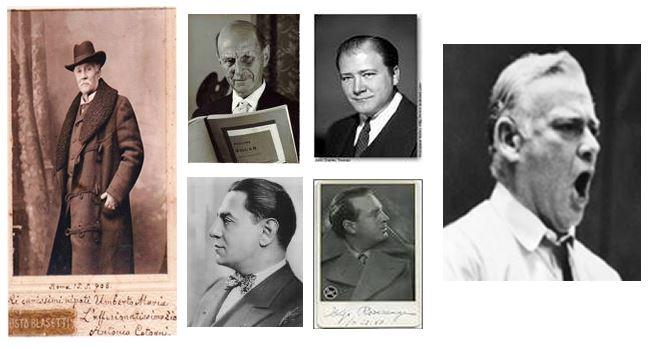Vocal
 From Signor Mufti of the original Schola Cantorum, to his pupil Riccardo Daviesi and Antonio Cotogni, to their pupil E. Herbert-Caesare; on to Mattia Battistini, to Beniamino Gigli, to Tito Schipa, to John Charles Thomas, to Helge Rosvaenge, to Robert Weede, to Keith Davis, and to my teacher and inspiration Seth Riggs my eternal gratitude for vocal direction; this individual application of seventeenth, eighteenth, and nineteenth century Italian Bel Canto Techniques (including an intimate understanding of Castrati Techniques of vocal registration balance) is the particular vocal pedagogy and tradition that I have tried to follow, explore, and emulate for over 30 years. Additional support from Richard Miller and Dr. Ingo Titze are forever appreciated.
From Signor Mufti of the original Schola Cantorum, to his pupil Riccardo Daviesi and Antonio Cotogni, to their pupil E. Herbert-Caesare; on to Mattia Battistini, to Beniamino Gigli, to Tito Schipa, to John Charles Thomas, to Helge Rosvaenge, to Robert Weede, to Keith Davis, and to my teacher and inspiration Seth Riggs my eternal gratitude for vocal direction; this individual application of seventeenth, eighteenth, and nineteenth century Italian Bel Canto Techniques (including an intimate understanding of Castrati Techniques of vocal registration balance) is the particular vocal pedagogy and tradition that I have tried to follow, explore, and emulate for over 30 years. Additional support from Richard Miller and Dr. Ingo Titze are forever appreciated.
These techniques were forged and tempered by the fierce demands placed on the world’s top performers throughout vocal history. It is exceptionally adaptable to a broad range of styles, because it does not force rigid technique. Applied in Opera to Rock; Jazz to Pop; Musical Theatre to R&B; it has also been practiced by actors to perfect their vocal presence and empower them in speech.
Since you are not learning WHAT to sing but rather HOW to sing and maintain an even balance through your passages, this Vocal Approach can be applied to any genre of music, language or style.

Instruction
“Tell me and I’ll forget; show me and I may remember; involve me and I’ll understand.” -Chinese Proverb
Whatever the content or subject, it has been my experience that a “Cause and Effect” approach to teaching is the most effective method. Because my method is application, each exercise I prescibe (whether in individual instruction or group clinics) is done in such a manner that the exact desired outcome is achieved directly as a result.
It is quicker and more accurate. Effective and efficient!
Although a picture can tell a thousand stories, the experience of one story is ALWAYS BETTER. When “descriptions” and “observations” become more important than or a substitute for the “ABILITY to DO,” YOUR learning will become the casualty!
Obviously to understand the basic principles underlying any endeavor is important, but just telling you “WHAT to do” does nothing to “HELP YOU do.” You have to know “HOW TO DO.” That can only be realized BECAUSE OF experience – YOUR experience.
Ability involves the coordination of many actions and thoughts. It requires not only the capacity to multi-task, but most importantly the proficiency to multi-focus. That is why each exercise will act first as a mechanical assist and, in doing so, become a psychological assist.
Additionally, I prefer to communicate using language that has a definite functional and mechanical relationship specific to you and the individual needs of your demands. Purposely guiding YOUR descriptions to ONLY follow YOUR experiences – not before – ensures your deepest and fullest understanding of the process of learning.

